A review of differential policies towards different populations draws attention to the ways in which civil society is mobilising to demand protection and an end to the stigmatisation of those with no escape from infection.
The growing coronavirus crisis has exposed many faultlines in the UK and in Europe, and in particular, governments’ treatment of refugees, asylum seekers and other vulnerable and marginalised populations including prisoners and homeless people, carries disquieting echoes.
‘War on Coronavirus’
In the UK, the crisis has exposed the yawning gaps in homeless provision, health and welfare systems corroded by decades of adherence to neoliberal ‘shrink the state’ policies, exacerbated by the near-destruction of local authorities’ powers and resources. With the infrastructure of public health provision stripped out, the underfunded and stretched health service is short of beds, staff and equipment. Retired staff in their 70s, told to stay home as vulnerable to Covid-19, are being asked to return to work, and when they get there, find themselves without vital personal protection equipment such as masks or gowns. The government – which describes the current public health emergency as a ‘war on coronavirus’ – praises them but neglects their health and endangers their lives, in an echo of previous governments’ praise for ‘our brave boys’ fighting in Afghanistan and Iraq, similarly put at risk of life through shortage of equipment. Now, belatedly, resources are being thrown at the NHS to acquire more bed spaces, with the military helping to set up a 4,000 bed hospital in the Excel Centre in London’s Docklands, a campaign to recruit a quarter of a million volunteers launched (adapting the famous WW1 Kitchener poster to ‘Your NHS needs You’), and three and a half million test kits bought for mass testing. But hundreds of refugee doctors who qualified abroad are unable to put their skills to use in the UK because of the length and cost of the re-accreditation process. Some work as cab drivers or in takeaways. They have called on the government and the General Medical Council to fast-track their accreditation so they can help the NHS tackle the pandemic.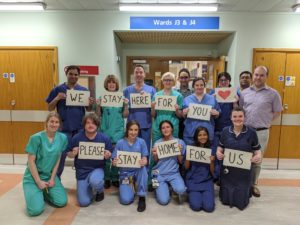
Many commentators have noted the British government’s sluggish, complacent response to the coronavirus – one shared by other European governments including Italy, Spain and France, which vulnerable people are now paying for with their lives. From an initial policy of doing nothing and letting the virus take its course, governments have moved, with varying degrees of speed, to a ‘mitigation’ policy which tries to contain the virus and then, as it became obvious that the death rate resulting from mitigation was unacceptable – between a quarter and half a million in the UK – to a policy of suppression, which tries to halt its spread through isolation, ‘social distancing’ and strict hygiene, until a vaccine has been developed (a process estimated to take eighteen months).
It has become clear, though, that governments have different policies for different populations. Most European countries are now in ‘lockdown’, with citizens forbidden to leave their homes except to buy food or medicine or for brief exercise, or to associate with more than one person outside their household. We must all practice social distancing and self-isolation, observe strict hygiene, wash our hands frequently and long.
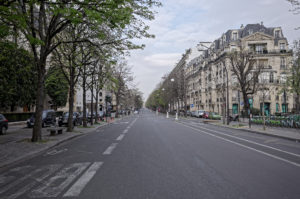
No hot water, no soap, no escape from infection
But those without homes or privacy cannot distance or self-isolate; nor can they observe strict hygiene, without access to hot water and soap. For homeless people in night shelters or on the streets, for prisoners and immigration detainees sharing overcrowded cells or rooms, toilets and communal canteens, for asylum seekers living in destitution in filthy, unhygienic hostels, for the refugees in the border camps in Greece, Bosnia, Serbia, Croatia, already described as ‘hell’ even before the coronavirus, and for the migrant agricultural workers whose homes are shacks and containers in the fields of southern Italy and Spain, with no access to clean water, there is no escape from the infection.
International human rights conventions signed by all European states declare that ‘Every human being is entitled to the enjoyment of the highest attainable standard of health conducive to living a life in dignity’. The right to health includes the right to control one’s health and body and requires that health facilities, goods, and services should be available in sufficient quantity, accessible to everyone without discrimination, and affordable for all.
What measures are being taken to protect them, to save them from the risk of death?
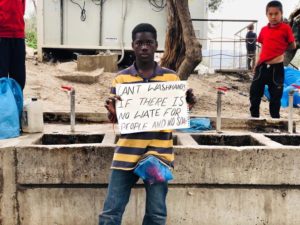
Homeless
Homelessness charities in the UK despair at the lack of places where up to 45,000 homeless people, using night shelters, homeless hostels or sleeping rough, can find safety and protection. Homeless people are three times more likely than the general population to suffer severe respiratory conditions, and so are exceptionally vulnerable to Covid-19. Night shelters, where homeless people sleep next to each other on floors, are closing as suspected cases are found. The government, accused of ‘sleepwalking’ on the issue, is making plans to lease empty hotels for homeless people, enabling self-isolation, but is meanwhile advising night shelters and hostels to stay open, despite the risks posed by close proximity.
In France and Belgium, too, there are few places for homeless people to go – particularly migrants and refugees. In Calais, Paris and Lille, many displaced people, including children, are living outside, with no shelter, sanitation or water points, at a time when day centres and charities are closing their doors – while in Brussels, a police operation added insult to injury by targeting homeless migrants in Maximilien park for not observing social distancing.
Detained: prisoners and immigration detainees
Human rights bodies including the UN High Commissioner for Human Rights and the Council of Europe Committee on the Prevention of Torture, prisoners’ and detainees’ groups are demanding the release of as many people as possible. As Inquest points out in its Covid-19 Briefing, people in detention are totally dependent on the state for their treatment and care. And as UN High Commissioner Michelle Bachelet observed in a statement of 25 March, those in closed institutions – Including prisons and immigration detention centres, nursing homes and psychiatric hospitals – are at high risk of infection. Subject to compulsion and sometimes force, to overcrowding, sharing communal canteens, toilets and cells, in close physical proximity and unable to self-isolate, with often inadequate sanitary facilities and little or no access to hygiene, detainees are particularly vulnerable. Epidemiologists estimate that the virus could kill 1 percent of those in the detention estate. With a far more rapid turnover of immigration detainees, the toll could be even greater.
Prisoners and immigration detainees are also stigmatised and most likely to be forgotten in a crisis. All over Europe, they are expressing their fear and anger over their helplessness in detention, their conditions, which have not improved, their being kept in ignorance at a time when they need information, help and reassurance more than ever, compounded by the suspension of visits and activities.
In the UK, the Ministry of Justice’s ‘urgent plans’ to safeguard staff, prisoners and visitors, released on 12 March, consisted of little more than posters urging hand-washing, and an adequate supply of soap and cleaning materials; prisons, the ministry said, were ‘well prepared’ to manage outbreaks of infection. A week later, as a prisoner at Strangeways prison in Manchester was taken to hospital and 22 others isolated, and 75 prison officers at HMP Berwyn in Wales were off sick or self-isolating, calls were mounting for more effective measures to control the spread of the virus in prisons, and the Howard League urged the release of everyone who could be safely released, and instructions to judges to stop sending people to prison. By 26 March, with two prisoners dead from the virus, 3,500 prison officers, ten percent of the workforce, off sick or self-isolating and thirteen inmates in nine prisons testing positive, visits cancelled and prisoners locked in their cells for 23 hours a day, many groups working with prisoners, including JENGbA, were adding their voice to the calls for – at least – early release for pregnant women, of immuno-compromised prisoners, of remand prisoners and of prisoners over tariff. Justice secretary Robert Buckland was said to be actively considering the demands of distraught families of vulnerable prisoners.
According to the prisons website Prison Insider, the virus has reached prisons in Scotland, Ireland, France, Belgium, the Netherlands, Spain and Switzerland as well as England and Wales. France recorded its first prison death in Fresnes, as human rights and prisoners’ rights groups condemned overcrowding and inadequate healthcare and hygiene; the suspension of visits by relatives led to a mutiny in Grasse prison (Alpes-Maritimes); and as the Controller General of Detention (CGLDL) demanded urgent measures to protect those in prison and detention centres, over 1,000 public figures, along with magistrates, lawyers and NGOs called for the release of those in pre-trial detention. In Belgium, thirty prisoners at Nivelles prison refused to return to their cells in protest at the suspension of visits, and prisons activist Luk Vervaet condemned the ‘forms of detention for society’s excluded which are clearly unacceptable in normal times, but in this crisis can’t ensure the health of detainees’, and called for the release of those in pre-trial detention and those serving short sentences. In Spain, 300 prisoners escaped after twelve prisoners were isolated, and the prison officers’ association APFP condemned the lack of preventive measures against the virus after staff in several prisons tested positive.
In the febrile atmosphere of closed institutions, fear of the virus, combined with lack of information and anger at official measures, has already caused at least fifteen deaths in prisons. Twelve people died in or after prison riots in Italy after visits were suspended, some after taking drugs stolen from dispensaries. In Romania, three prisoners died when mattresses were set on fire in protest at the suspension of visits.
Immigration detainees
As two detainees tested positive at Colnbrook, the release of all immigration detainees was demanded in an open letter signed by dozens of migrants’ rights, medical and civil liberties organisations including Liberty, Medact, JCWI, Migrants Organise, Migrant Voice, Detention Action, AVID, BID and Right to Remain, and supported by Labour shadow immigration minister Bell Ribeiro-Addy. Fears of infection among detainees, many of whom have serious health problems such as diabetes, HIV and asthma, in centres with blocked sinks, a shortage of soap and up to two weeks waiting for medical attention, have led to more people self-harming in detention, according to Detention Action, which has launched a petition demanding the immediate release of detainees (sign it here). Detention Action also wrote to MPs urging them to demand the release of detainees during the debate on the Coronavirus Bill on 23 March. The letter pointed out that ‘rooms are multiple occupancy with toilets in rooms and hundreds of individuals are mixing each day, including with staff and visitors coming in and out of the centre. Following Government advice on hygiene, self-isolation and social distancing is impossible for those in detention … even simple steps such as ensuring that soap and sanitiser is provided to everyone in detention have not been taken’. An attached expert report warned that a scenario where 60 percent of detainees become infected was ‘plausible and credible’. On 25 March, when three of the seven IRCs had people quarantined with Covid-19 symptoms, the High Court rejected a legal challenge to the Home Office’s failure to safeguard those in detention, and its continuance of detention when deportation is impossible, saying that the measures taken, including provision of single-occupancy rooms and face masks, ‘would be sufficient to address the risks arising in the majority of cases’. It was the efforts of organisations such as Detention Action which forced the Home Office to release a third of the roughly 1,000 detainees in the detention centres, and to take the protective measures it did. 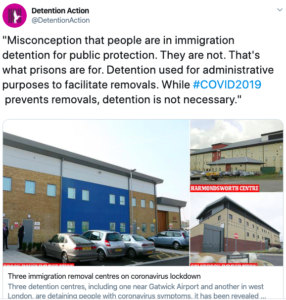
In Spain, immigration detention centres are closing and people being released because they will not be able to be deported, and in France, some courts have ruled that people should be released from detention, as deportation is impossible – but others have dismissed applications for release. There have been hunger strikes at Lesquin and Coquelles over the lack of protective measures for detainees. In Corfu, 1,200 migrants at the Corinth detention centre are said to be on hunger strike in protest at detention conditions.
Containment not suppression
While prisoners and immigration detainees remain in close proximity, the spread of the virus can only be contained, not suppressed – and that means a death rate that governments know would not be acceptable in other contexts. And the Greek government seems to be applying just such a policy of containment in the squalid, overcrowded and insanitary island camps where over 41,000 refugees and displaced people share facilities designed for a total of 6,000. The camps are in lockdown, with inmates restricted from leaving, and no visits from NGOs permitted, while the government does nothing to remedy the lack of basic hygiene facilities. Calls from hundreds of NGOs from across Europe to the Greek government to evacuate the camps, or decongest them, have so far fallen on deaf ears. Residents are taking what measures they can to protect themselves and each other. A group of women with tailoring experience in their own countries have set up a factory making reusable face masks, with crowdfunding ensuring a supply of materials.
The state of asylum hostels in the UK, breeding grounds for infection, is described by John Grayson in this issue.
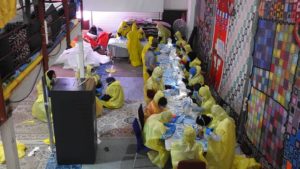
Stigmatisation and blame
Measures to corral refugees and migrants go hand in hand with xenophobic statements suggesting the virus is their fault, thereby inciting racism, violence and abuse and justifying their exposure to fatal risk. In Serbia, all asylum centres are in lockdown to prevent ‘uncontrolled movement of persons who may be carriers of viruses’. In Bosnia, the security minister reportedly said migrants were ‘at the centre of the outbreak, and must be taken off the streets’. ‘It is of utmost importance to erect tents for the migrants, surrounded with barbed wire so as to limit their movements’, he said. In the canton of Una-Sana, the 2,000 or so migrants sleeping rough are to be rounded up and put in the camps, which residents are forbidden from leaving – and the mayor of Tuzla has used the virus to ban the distribution of food and water to migrants. In Hungary, Viktor Orban said there was a risk of coronavirus from illegal immigrants, and closed the transit zone, denying access to asylum seekers and leading the UN High Commissioner for Human Rights to warn against using ‘emergency declarations based on the Covid-19 outbreak … as a basis to target particular groups, minorities, or individuals. It should not function as a cover for repressive action under the guise of protecting health nor should it be used to silence the work of human rights defenders.’
The effects of coronavirus on migrant workers
It took huge political and social pressure for the hard-right faction of the Conservative party which runs the British government to extend its coronavirus aid package from tax relief and loans to businesses and mortgage holidays for home owners, to protection for renters and waged workers. And it took further massive pressure from the TUC and many others to extract a promise that the UK’s five million self-employed workers, many low-paid such as cleaners or Deliveroo drivers, among whom a disproportionate number are migrant workers, would also get some protection and would not be left to apply for universal credit, with its five-week wait, or rely – if they are ill – on statutory sick pay of £94.25 a week.
Many migrant workers fall into the category of workers who (unless they are ill) cannot stay at home, as their jobs require hands-on work which truly is essential: caterers, hospital cleaners and porters, carers, supermarket cashiers and delivery drivers, health workers, agricultural and domestic workers. None would be eligible to remain in the UK under the new government’s immigration policy which defines those earning under £25,000 as low-skilled and unwanted. But there is little if any protection for these vital workers, whose contracts often give them few if any rights, and who may find themselves unemployed if they stay away from work. Many are on visas which forbid ‘recourse to public funds’, so would be unable to claim universal credit or other state benefits if unable to work. At work, the nature of their jobs can expose them to physical danger: outsourced hospital cleaners at Lewisham hospital, joined by catering staff and porters, staged a walk-out on 12 March over the failure of their employer ISS to provide protective equipment for them and its failure to pay them – but the company responded by threatening not to pay them the previously agreed pay rise if they protested.
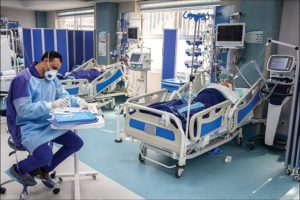
Adding insult to injury, they would also be paying an annual health surcharge to access NHS hospital treatment – currently £400 per year, going up to £624 in October, unless they have settled status. Some health workers have even found themselves targeted for eviction or threats of eviction by landlords frightened they will bring the virus home, or been subject to racist abuse – a nurse described how she was racially abused and assaulted after doing an overtime coronavirus shift.
Then there are the undocumented migrants, estimated at a million in the UK, including people who have overstayed visas, and refused asylum seekers eligible for support amounting to £37.75 a week or often no support at all, not allowed to work and reliant on day centres, churches and other sanctuaries which have closed. Migrant justice organisations including Project 17, the Public Interest Law Centre and Migrants’ Rights Network, have written to councils warning that people may be at risk not just from the pandemic but also from starvation, and urging them to establish Covid-19 homeless task forces to provide help and safe housing for them.
War, Windrush and solidarity
There have been some small victories. After a campaign organised by Scottish migrant support group Positive Action in Housing, the Home Office agreed to allow asylum seekers to send new applications and submissions to the Home Office by post or email, rather than force them to deliver the documents in person to Liverpool. The campaign was launched when a 48-year-old asylum seeker in a high-risk category for the virus was forced to make three journeys on public transport from Glasgow to Liverpool, at a time when the government was advising that all non-essential travel cease, simply to deliver letters containing further submissions, as the Home Office refused to let her post them.
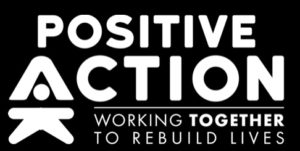 There have been further small concessions by the Home Office to some migrants and asylum seekers affected by the virus: visas are automatically extended to 31 March and will be extended for a further two months for those who cannot leave owing to travel restrictions or self-isolation provided they contact the Coronavirus Immigration Team; those who cannot attend biometric appointments will not be penalised; regular reporting as a condition of immigration bail is deferred; international students at UK universities and colleges can use distance learning; requirements for sponsors to report changes in the situation of students and workers are relaxed; all asylum interviews have been paused; and the Home Office has announced that there will be no charges for NHS coronavirus testing and treatment.
There have been further small concessions by the Home Office to some migrants and asylum seekers affected by the virus: visas are automatically extended to 31 March and will be extended for a further two months for those who cannot leave owing to travel restrictions or self-isolation provided they contact the Coronavirus Immigration Team; those who cannot attend biometric appointments will not be penalised; regular reporting as a condition of immigration bail is deferred; international students at UK universities and colleges can use distance learning; requirements for sponsors to report changes in the situation of students and workers are relaxed; all asylum interviews have been paused; and the Home Office has announced that there will be no charges for NHS coronavirus testing and treatment.
But these are drops in the ocean. So far, campaigners’ demands to suspend all NHS charges, data sharing and the ‘No Recourse to Public Funds’ rule, to enable migrants to access healthcare and public services without fear, have not been met. Neither has the demand for specialist support in asylum housing, and to release all immigration detainees, to prevent the spread of the virus and the risk to public health. The government’s hostile environment policies of exclusion from housing, social services, healthcare, welfare support and work leave undocumented people and those with precarious status with nowhere to go, and fear of arrest – and subsequent immigration detention and eventual deportation – could prevent infected people from seeking help, thus endangering whole communities.

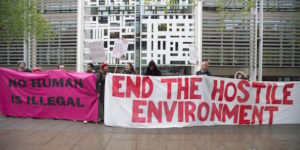 It is these policies, which treat immigration status as the sole determinant of virtue and high income as the sine qua non of immigration status, which endanger lives. But instead of dismantling the policies, the government reaches for yet more policing measures – powers of arrest and detention for police and immigration officers, this time in relation to those suspected of carrying the virus.
It is these policies, which treat immigration status as the sole determinant of virtue and high income as the sine qua non of immigration status, which endanger lives. But instead of dismantling the policies, the government reaches for yet more policing measures – powers of arrest and detention for police and immigration officers, this time in relation to those suspected of carrying the virus.
The Windrush review, published as the virus took hold, looked in depth at another scandal, in which people who had faithfully given their working lives to Britain, often in the NHS, were treated with brutality and contempt for want of papers proving their right to be here, losing jobs, homes, liberty and sometimes life. The scandal demonstrated the ripple effect on families, neighbourhoods and whole communities. Coronavirus is another potential scandal in the making, as well as a crisis. Its lesson is that only universality of provision will protect all. Labour leader Jeremy Corbyn caught the public mood in calling for help for those on the margins of society, who ‘are vulnerable themselves and make us vulnerable … Only collective public action led by government can protect our people and our society.’ Only solidarity, not the survival of the fittest, protects us all.
related links
Read John Grayson’s Aslyum in the time of Covid-19 here
Read our round up of Coronavirus race and civil liberties issues here

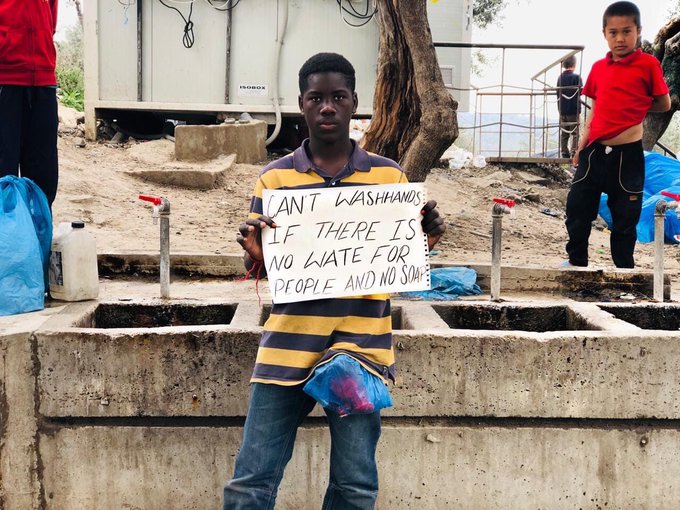
Circulated to Black South West Network in Bristol for whom I work as a volunteer.
Also sent to SNP BAME Network of which I am a member
Copies sent to Graeme Dey MSP and Dave Doogan MP.
Alexandra Macrae
Thank you for this disturbing yet useful information – as usual well-documented.
Thank you for such a penetrating analysis of the discriminatory policies that are having profound effect on the homeless, refugees, migrant workers, prisoners, detainees amongst others. The ‘hostile’ environment policies should be abandoned forthwith. The demands made by progressive organisations are pertinent for the fight for social justice. I hope that this is read very widely. I have circulated it.